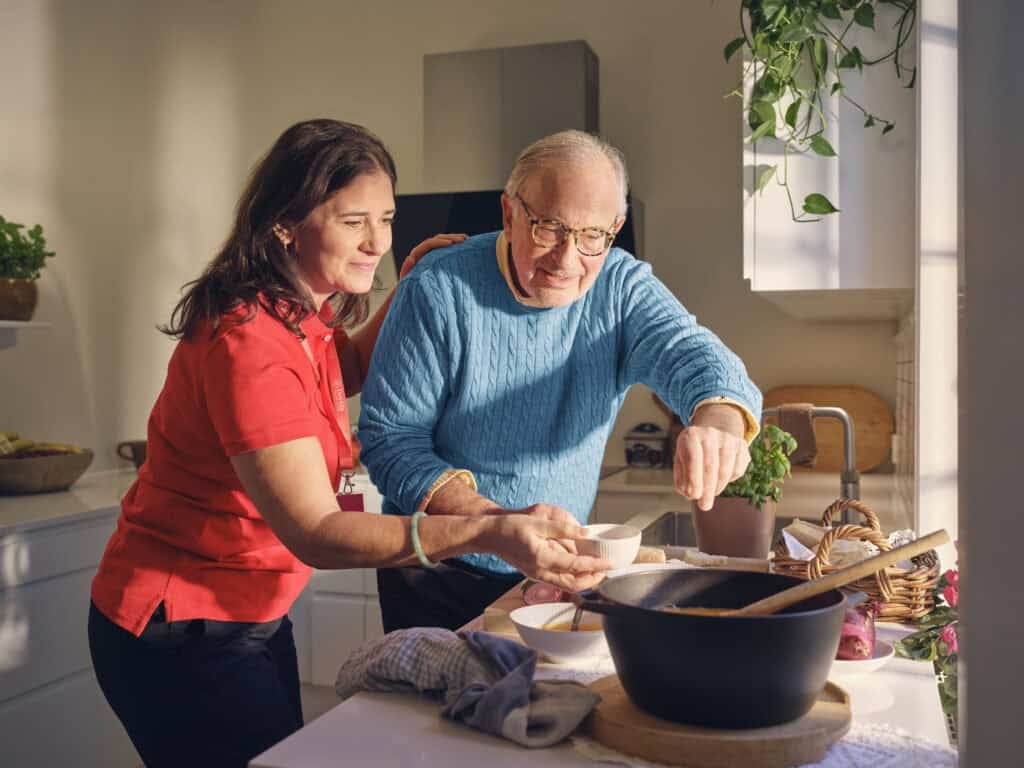Blog
31 August 2025
The Caregiver’s Dilemma: When Love Isn’t Enough
Whilst a loved one deals with the challenges of dementia, there’s often another group that deserves recognition: the family members who provide daily care, often at great personal cost. Understanding when love needs professional support is one of the most difficult decisions families face.
The Reality of Family Caregiving
In Australia, family members provide approximately 2.2 billion hours of unpaid care annually (carersaustralia.com.au/replacement-value-of-unpaid-care-in-australia-rises-to-77-9-billion-per-year/). These carers – predominantly women – often juggle their caregiving responsibilities with jobs, raising children, and managing their own households.
The emotional toll is immense. Watching a loved one’s personality change, dealing with challenging behaviours, and grieving a relationship that’s transforming can lead to what experts call “anticipatory grief” – mourning someone who’s still physically present but psychologically distant.
Recognising the Warning Signs
Many family carers push themselves beyond healthy limits, believing that providing care themselves is the only way to show love. However, carer burnout not only harms the carer – it can also compromise the quality of care provided to the person with dementia.
Warning signs include:
- Chronic exhaustion that doesn’t improve with rest
- Increased irritability or impatience with the person receiving care
- Neglecting personal health, friendships, or other family relationships
- Feeling resentful about caregiving responsibilities
- Physical symptoms like headaches, sleep problems, or frequent illness
The Guilt Factor
Perhaps the greatest barrier to seeking professional help is guilt. Family carers often feel that asking for help means they’re failing in their duty or abandoning their loved one. This guilt is compounded by well-meaning friends and family who praise them for “being so devoted” or express surprise when they mention feeling overwhelmed.
The truth is that recognising your limitations and seeking appropriate support is actually a sign of wisdom and love. It takes courage to admit that the situation has become bigger than what you can handle alone.
Redefining Your Role
Accepting professional dementia care doesn’t mean stepping away from your loved one’s life – it means changing your role from primary carer to primary advocate and source of emotional support. This shift can strengthen your relationship by removing the daily stress of care management.
When professional carers handle medication management, safety monitoring, and daily care routines, family members can focus on what they do best: providing love, companionship, and emotional connection. Visits can become about sharing memories, enjoying activities together, or simply being present without the pressure of care tasks.
The Benefits of Professional Expertise
Trained dementia carers bring specialised knowledge that family members may not possess. They understand how to respond to challenging behaviours, can recognise subtle changes that might indicate health issues, and know techniques for encouraging cooperation without confrontation.
This expertise is particularly valuable during difficult phases of dementia progression. Sundowning, wandering, and aggressive behaviours can be frightening for family members to handle alone. Professional carers have strategies and training to manage these situations safely and compassionately.
Building a Sustainable Care Plan
The most successful dementia care plans are those that can adapt and evolve over time. Starting with limited professional support – perhaps a few hours a week – allows families to adjust gradually whilst maintaining their involvement in daily care.
As needs increase, support can be expanded accordingly. This might mean increasing hours, adding overnight care, or introducing specialised services like physiotherapy or social activities. The key is building a flexible system that supports both the person with dementia and their family.
Practical Steps Forward
If you’re struggling with caregiving responsibilities, consider these steps:
- Start with respite: Even a few hours a week can provide crucial breathing space and perspective.
- Join support groups: Connecting with other families facing similar challenges can provide practical advice and emotional support.
- Consult professionals: Geriatricians, social workers, and dementia care specialists can help assess needs and recommend appropriate services.
- Plan for progression: Discuss future care needs while your loved one can still participate in decision-making.
Taking Care of Yourself
Remember that maintaining your own physical and emotional health isn’t selfish – it’s essential. You can’t provide good care from a place of exhaustion and resentment. Professional dementia care services understand this and work to support the entire family unit, not just the person with dementia.
Give yourself permission to ask for help. Your loved one needs you to be present, engaged, and emotionally available – qualities that are only possible when you’re not overwhelmed by the daily demands of care. Sometimes the most loving thing you can do is share the responsibility with professionals who can provide the specialised support your family needs.
